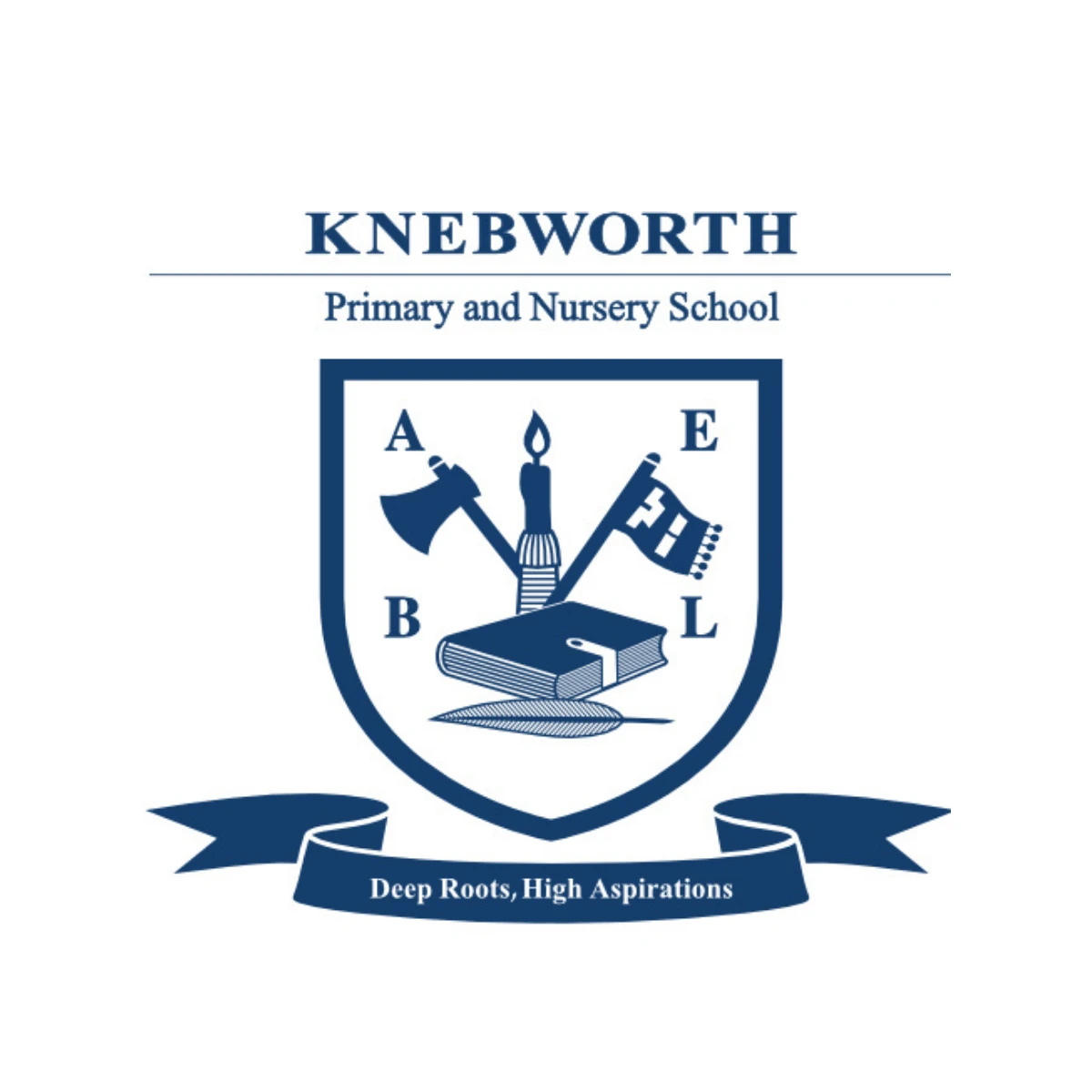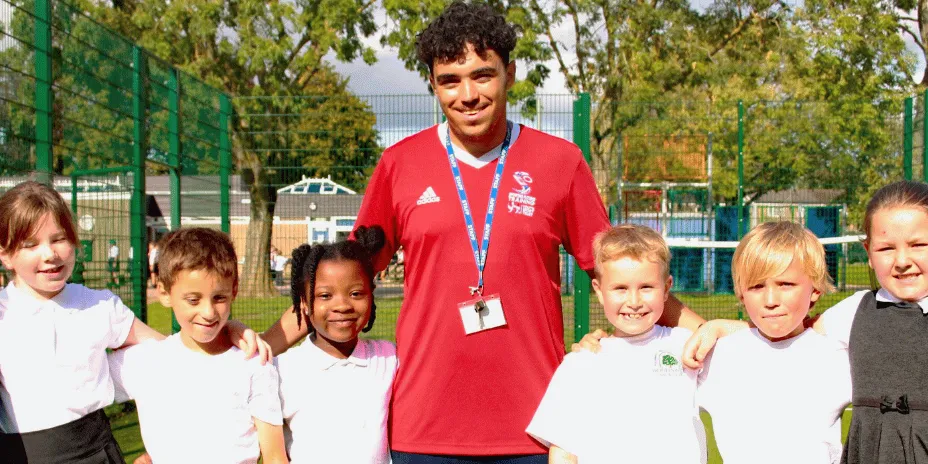Our friendly, knowledgeable team are ready to chat
Call us: 01784 222 300
Apply now: complete application form
Looking for a role? Send your CV:
Send CV: cv@esfapprenticeships.co.uk
GET IN TOUCH

Our friendly, knowledgeable team are ready to chat
Call us: 01784 222 300
Email us: info@esfapprenticeships.co.uk
GET IN TOUCH

For delegates
For employers
Benefits
Course content
The role
How will I learn?
Dates
Eligibility
FAQs
Inspire people of all ages to lead healthier, more physically active lifestyles.
Level 2 Community Activators are employed by a community sports organisation to help deliver sporting activities that encourage whole communities to adopt a more physically active lifestyle. Learn through perfectly balanced on-the-job training, that includes practical tasks and workshops delivered by qualified teachers and sports specialists.
Funding for this apprenticeship
£0
Cost to delegate
£6,000
Funding band for this apprenticeship
Benefits for learners
Completing this apprenticeship will allow you to:
- Gain the confidence, knowledge and skills to lead group physical activities Inspire participants of all ages to make lasting lifestyle changes.
- Work collaboratively with other coaches, apprentices, volunteers and local community partners to produce engaging sporting events
- Learn while you are earning a wage doing a job you love
ESF Apprenticeships has long-standing partnerships with many community sports organisations who regularly hire apprentices. This includes;
- Football clubs (Wycombe Wanderers Foundation, Cambridge United Foundation and Stevenage FC Foundation)
- Climbing centres
- Schools Sports Partnerships
- Gymnastics clubs
- Local and county cricket clubs.
Course content
Core knowledge, skills and behaviours covered:
- Understanding the role of a Sports Ambassador in building community relationships and supporting mental health. You will receive safeguarding and first aid training from your employer.
- Knowing how to plan and lead key components of successful sporting activities for specific audiences. You will be able to evidence how to adapt sessions according to customer feedback and monitor and evaluate progress.
- Understanding the basic principles of behavioural change when applied to sport and physical activity, and how to help participants make life-long changes.
- Working effectively with customer insight teams to overcome individual, community and societal barriers to participation in physical activity.
- Understanding effective communication, leadership techniques, and motivation strategies.
- Using technology to maximise impact, leveraging social media and producing targeted messaging for different audiences, as well as data analysis tools to engage your community.
- Understanding the importance of accurate record keeping for monitoring and evaluation purposes; know about the tools available to help (e.g. Upshot, Views, Active Lives).
“I enjoy the ESF training sessions, they are engaging and have helped me to develop my coaching skills such as organisation and leadership, as well as realising how important communication is when working in a team environment.”
The role
The role of a Community Activator involves breaking down barriers, and inspiring individuals of all backgrounds to embrace active, healthy lifestyles. This might include:
- Being a community ambassador for the organisation, promoting
wellbeing and physical activity in the community. - Breaking down barriers, and inspiring individuals of all backgrounds to embrace active, healthy lifestyles.
- Supporting the delivery of community sports activities, including everyday sessions and holiday programmes.
- Helping families to participate together in sport and physical activity.
- Delivering project-based tasks to support the whole organisation agenda.
- Providing support at key community events to promote the values and ethos of your organisation.
How will I learn?
Our apprentices based within a community setting work 30 hours a week, with training being delivered through a blended learning approach involving virtual and face-to-face sessions.
Off the job training includes:
- Weekly, live virtual tutoring sessions led by our experienced qualified teachers/tutors.
- Termly face-to-face practical training days. (A full day of active, hands-on learning for learners able to travel to Stevenage, Hertfordshire or replacement virtual option if you are unable to attend).
- Practical projects (tasks that demonstrate the knowledge, skills and behaviours being developed and will have a direct positive benefit to your organisation).
- On-site tutor visits.
- Collaborating with other apprentices working in similar environments throughout the programme.
- Optional SEND masterclasses – free interactive 2/3 hour webinars from our SEND experts.
Assessment includes:
- Practical observation of delivering activity sessions for small groups
- Professional discussion
- Short presentation
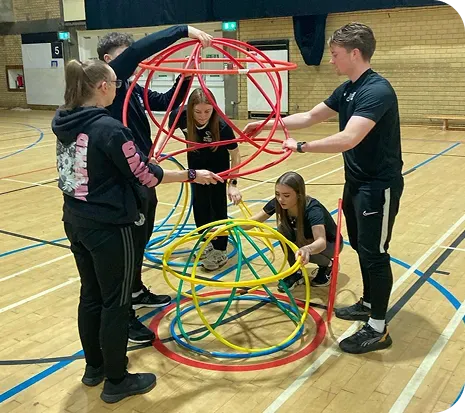
Eligibility
We’d love to hear from applicants who are:
- Good with people – you’ll need the ability to build positive relationships with people from all walks of life.
- Effective communicators – clear and confident verbal and written communication skills.
- Team players – the role needs a good team player who is passionate about supporting learning.
Qualifications and other criteria:
No qualifications are required if you are aged 19+ (although it is desirable to have maths and English GCSE at Grade 4/C or above)
For apprentices aged 16-18:
- Grade 4/5 (C and above) at GCSE in maths and English.
- If you don’t have the above, you must be able to complete Level 1 Functional skills before you reach End-Point assessment. You should also be working towards your Level 2 Functional Skills as part of your apprenticeship (but it’s not a requirement to pass before completion).
- We can support all learners to gain these valuable qualifications. Find out more.
- You must have held a residency in the England for the last three years and have right to work in the UK.
Course start dates
You can apply to start this apprenticeship April 2026 or September 2026
Learner FAQs
What career pathways does this apprenticeship open up?
You may choose to stay within a community setting and work your way up to becoming a more senior coach, or work in the leisure industry, with career options in leisure management or sports development. Alternatively, if you prefer working with younger people, you could become a teaching assistant who specialises in PE. You could go on to study the following qualifications:
Specialised Coaching Qualifications: You can pursue specific coaching qualifications within your chosen sport to become a high-level coach.
Level 3 Teaching Assistant with a PE and Wellbeing Focus: If you’re interested in working within a school setting, this can be a natural progression.
Level 4 Sports Coach Apprenticeship: This would allow you to develop more advanced coaching skills and potentially specialise in a particular sport or type of coaching (e.g., high-performance, community, or school pathways).
Can you help me find an apprenticeship job?
Our recruitment team work with lots of community sports organisations looking to hire apprentices. Please send your CV to cv@esfapprenticeships.co.uk.
What do community activators typically earn?
The annual wage for a Community Activator Apprentice generally starts at the statutory National Minimum Wage and can go as high as £15,600.
Study this apprenticeship with us
Complete our short online form and we’ll be in touch with information and application instructions.
Don’t miss out – next course start date: April 2026
Benefits
Course content
Levy funding
Employer commitments & FAQs
Expand your community sports provision by hiring enthusiastic Community Activator apprentices
In this role apprentices can support everyday sessions, events and holiday programmes, deliver project-based tasks to support your whole-organisation agenda and be a positive community ambassador for your organisation.
Funding for this apprenticeship
£0
Cost to delegate
£6,000
Funding value for this apprenticeship
£300
Maximum cost to non-levy paying settings.
You may receive an additional £1,000 incentive for hiring apprentices aged 16-18
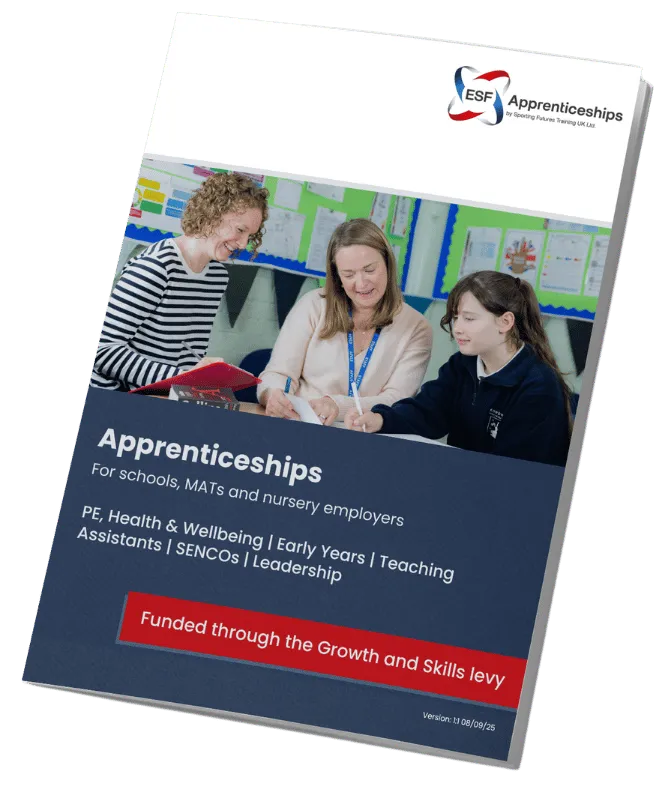
Funding for this apprenticeship
Benefits for employers
- Increasing staff capacity to enable the provision of a greater number of sessions or events, or holiday programmes offered in your local community.
- Upskilling your existing staff to provide them with up-to-date knowledge of national trends, strategies for social change, local participation and performance data, and contemporary influences.
- Improving the way your staff engage with the local community and implement inclusive coaching practices.
Increase capacity and employ an apprentice
Our free of charge hiring service includes job advert creation and placement, applicant screening and first-round telephone interviews. We’ll also help with logistics and apprenticeship onboarding.
Upskill your existing team
Bring new skills and knowledge into your organisation and improve staff retention with on-the job training and career progression pathways for staff. Delegates will undertake a series of practical projects that will add value to your organisation. They can also share up-to-date knowledge with other members of your team.
“We have benefitted in multiple ways from the introduction of numerous cohorts of apprentices, not only in our ability to work with and engage with more participants in our community, but also in our ability to invest in the apprentices to grow our full time and part-time workforce.”
Course content
Core knowledge, skills and behaviours covered:
- Understanding the role of a Sports Ambassador in building community relationships and supporting mental health. Learners will receive safeguarding and first aid training from their employer.
- Knowing how to plan and lead key components of successful sporting activities for specific audiences. Learners will be able to evidence how to adapt sessions according to customer feedback and monitor and evaluate progress.
- Understanding the basic principles of behavioural change when applied to sport and physical activity, and how to help participants make life-long changes.
- Working effectively with customer insight teams to overcome individual, community and societal barriers to participation in physical activity.
- Understanding effective communication, leadership techniques, and motivation strategies.
- Using technology to maximise impact, leveraging social media and producing targeted messaging for different audiences, as well as data analysis tools for community engagement.
- Understanding the importance of accurate record keeping for monitoring and evaluation purposes; know about the tools available to help (e.g. Upshot, Views, Active Lives).
Levy funding
The Growth and Skills Levy (formerly known as the Apprenticeship Levy) is essentially a fund set up to support the training and development of staff through apprenticeships. Funds are collected and put into a digital account for employers.
- Who pays it? Anyone with an annual wage bill over £3 million.
- How does it benefit your school? The money in this account can be used to pay for apprenticeship training for both your existing staff and any new apprentices you hire. Apprenticeships are available for anyone aged 16 and over, from Level 2 right up to Level 7, covering a wide range of skills.
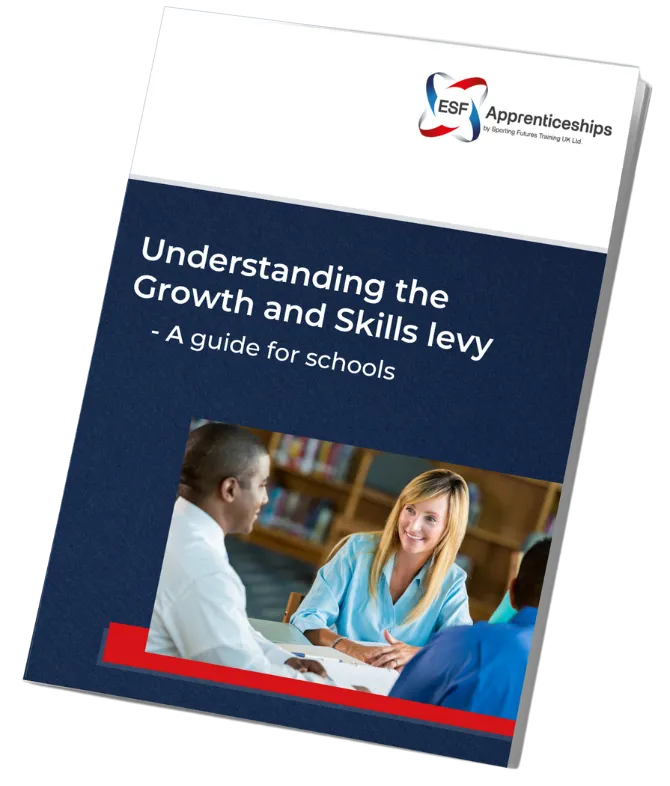

Employer FAQs
What is the release time required for this apprenticeship?
Apprentices will need release time for weekly, three-hour training sessions on Zoom (morning or afternoons), termly progress reviews, and three full-day, face-to-face practical training events a year. During these sessions they will have the opportunity to share ideas with other apprentices, as well as receive feedback from their ESF tutor.
Please note that the face-face events are located in Stevenage, Hertfordshire. For those who are further than one hour travel time, we offer a morning virtual session.
They will also need some time to carry out practical projects that will directly benefit your organisation.
Every six weeks during term time, we also offer online SEND Masterclasses. Release time for these sessions is optional and you can choose which sessions may be appropriate for your learner.
You will be provided a training calendar at the start of the programme showing all training dates.
How can I access levy funding?
If you have a payroll exceeding £3 million per year, your organisation will have been already paying into the Growth and Skills levy (formerly known as the Apprenticeship Levy). To determine who controls the funds, how much you can access, and the steps to get it, speak to your business manager, or finance team.
What if we don’t pay the levy?
If you don’t pay the Growth and Skills levy then the Government will fund 95% of the apprenticeship and you will need to commit to paying 5% of the fee.
Larger organisations can support other organisations, by making up to 50% of their annual levy funds available to eligible employers who need financial assistance with apprenticeships. ESF Apprenticeships should be able to support your organisation to fund the whole cost this apprenticeship using another organisation’s unused funds via a process known as Levy Transfer.
We can provide more information if you are interested in pursuing this route.
What are the Off-the-Job Training requirements for apprenticeships?
Off-the-Job-Training (OTJT) is an essential part of an apprentice’s development. It is dedicated time, during normal working hours, in which apprentices can focus on learning and applying new skills.
This protected time is required for apprentices to engage fully with their learning and development activities. All of the required learning, live workshops and projects completed during the programme count towards off-the-job time.
Our apprenticeship tutors will sign-post opportunities which count as Off-the-Job-Training and during the enrolment meeting we can discuss how this can work alongside busy job roles.
What are my commitments as an employer?
- You’ll need to provide a formal employment contract covering the duration of the apprenticeship
- An apprentice must be paid at least the minimum apprenticeship wage in their first year of learning
- Apprentices aged 19+ must be paid at least the minimum wage for their age group in their second year of learning
- You must assign a mentor who can support the learner in the role, attend termly progress reviews with the tutor and the learner, as well as a 1 hour Gateway meeting at the end of the programme to progress the learner to the end-point assessment.
Who should mentor a Level 2 Community Activator?
We recommend choosing a member of staff who can provide structured guidance, help set goals, and can relate to the challenges and opportunities the apprentice might encounter – perhaps even having previously held similar roles. They will have a deep understanding of the organisation’s community activity programmes and the learner’s responsibilities.
What if my apprentice needs to study for their Functional Skills?
For apprentices aged 16-18, without the necessary GCSEs, additional release time will be needed for Functional Skills qualifications in English, and maths. Apprentices will be fully supported by our experienced tutors.
See all >
Develop your workforce
Complete our short online form and we’ll be in touch to discuss your needs.
Don’t miss out! Next course start date: April 2026






